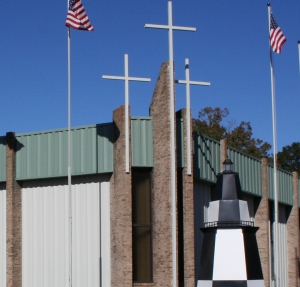Our Response To The Election
We are still in the aftermath of Election Tuesday. After months of campaigning, the political dust has settled and our President is still Barack Obama. Some are celebrating and others are devastated and in shock. Whether your candidate ended up winning or losing, there’s a message in this for all of us. It’s clear and simple, God establishes authority figures in our lives. That’s the entirety of the message. Nothing really profound. God establishes authority figures in our lives.
The Apostle Paul hit the nail on the head when he said, “Let every person be subject to the governing authorities. For there is no authority except from God, and those that exist have been instituted by God.” (Romans 13:1, ESV) That’s true if your guy won or if your guy lost (by the way, my guy lost).
Whether you won or whether you lost, what matters now is what response you give. You can gloat because you won or you can complain and moan because you lost or you can do something that is nothing less than beautiful. You can seek God on the President’s behalf—praying fervently for his wife and his children and that he would turn his life over to the one true living God and become sensitive to His voice. We can get involved in our community. We can become the change that we long for in Washington.
What if Christians became known as that group of people who are a source of Christ‘s grace and strength for our political leaders? Remember, God establishes authority figures in our lives. These authority figures are going to need God’s grace and strength more than they can possibly know.
What is Christmas All About?

One of my favorite Christmas specials of all-time is A Charlie Brown Christmas. In the cartoon, Charlie Brown wrestles with the true meaning of Christmas in the midst of a world that seems overloaded with commercialism. The special first appeared in 1965, and the issues Charlie Brown grapples with ring just as true today as they did 46 years ago.
In one scene, Charlie Brown is so frustrated, he yells, “Isn’t there anyone who knows what Christmas is all about?” Charlie’s friend Linus answers Charlie Brown by stepping out onto the auditorium stage and reciting the Christmas story straight from the Gospel of Luke. So simple, it seems. Yet today, many people celebrate the holiday for a lot of reasons, and some have nothing to do with the birth of Christ, like family traditions, a day off from work, a time of gift-giving, Santa Claus, parties, and so on. Commercialism and materialism is a part of the fabric of Christmas celebrations in our society. It’s easy to forget that “Jesus is the reason for the season.”
Make this one of your best Christmases by choosing to make the birth of Jesus the primary motivation for your celebrations.
More Precious Than Rubies
 Nothing is as contemporary as the question of the role of women — both in the home and outside the home. Also, nothing generates a more heated debate than diving into the issue without consulting the Word of God.
Nothing is as contemporary as the question of the role of women — both in the home and outside the home. Also, nothing generates a more heated debate than diving into the issue without consulting the Word of God.
In Proverbs 31:10-31, Lemuel profiles a woman who is godly, creative, industrious, sensitive, has many talents … and she is a wife and a mother! She wears many hats: she is a seamstress (v. 13), a merchant (v. 14), a chef (v. 15), a real estate broker (v. 16), a gardener (v. 16), a fitness enthusiast (v. 17), and a volunteer (v. 20). The most interesting fact, to me, is that her energies are primarily directed toward her home (v. 27), her husband, and her children (v. 28).
Wives, God didn’t place you in your home to stifle your creativity, He placed you there to stimulate it. Think of your home and family as a sort of science project and Proverbs 31 as your manual. Take a verse and experiment with it today.
If you’re not a wife, reflect on how your life has been affected positively by a godly woman who is “more precious than rubies” — and, if she’s still with us, let her know how appreciated she is. A godly woman is someone who is to be admired.
A Place to Call Home!
 I’ve been reflecting a lot lately. This week marks 25 years since I came on staff at Calvary Assembly of God (that seems strange to even type). I was a young, green, almost 21 year old and stepped into a position at the church in which I grew up (the church that my father pastored for 45 years until he retired in 2008). I’ve learned a lot in 25 years and still have a lot to learn, but that’s not the focus of this blog post. I’m reflecting on relationships and the sense of home that I feel here at Calvary.
I’ve been reflecting a lot lately. This week marks 25 years since I came on staff at Calvary Assembly of God (that seems strange to even type). I was a young, green, almost 21 year old and stepped into a position at the church in which I grew up (the church that my father pastored for 45 years until he retired in 2008). I’ve learned a lot in 25 years and still have a lot to learn, but that’s not the focus of this blog post. I’m reflecting on relationships and the sense of home that I feel here at Calvary.
At our core we are a people of congregation. Who we are can be defined in many ways by the depth of our relationships. Now, how relationships are defined in each of our lives can play out in many of ways. Some of us are more outgoing in our approach and consider everyone to be a friend. Others may desire deep community with a few that we consider our inner circle. Still others may find themselves floating in relationship isolation, unsure how the community thing is going to play out in their life.
Let’s focus on relationships within the Church and see how God sees this playing out. God defines the Church as the Body of Christ. What does that mean!? When Christ finished his ministry on earth, he went to Heaven to be with his Father, God. He didn’t leave us high and dry though. He stayed with us in the form of the Holy Spirit. You know that small still voice that guides us toward God, that gut-feeling we get at times? That’s Him. The fact that we now have the Holy Spirit communicating Christ through us allows us to fullfil our role as Christ’s Body – the Church.
This leads me to the importance of finding a community of believers that you can call home – a community that teaches the truth of Christ as defined by the scriptures. In a time when real geniune personal community seems to be a struggle for our society, I am thankful that I have found a church that really promotes group discipleship. God tells us in His Word that we need to find community together as His Body. This is how the Body of Christ is designed to function and how his truth will be effectively administered to all who are called to know Him.
I’ve seen people over the years that are so “spiritual” that they are not tied to one church body. They float here and there and never put down roots. They don’t add anything to the church where they attend on any given Sunday, because it’s always about what they can get out of it. Christ calls us to exhort one another. To edify and build up the body. We can only do that when we put down roots, join ourselves to a local church body, and contribute to that body with our time, talent, and treasure.
If you haven’t yet – Find A Church to Call Home and be an asset to that church!
Before The Shot
 I don’t get a chance to play much, but I like to play golf. In the game of golf, what I do BEFORE the shot is crucial to whether or not I make a good shot. My goal is to be consistent and predictable in my routine. My thoughts and movements prior to my swing helps to prepare for the swing itself.
I don’t get a chance to play much, but I like to play golf. In the game of golf, what I do BEFORE the shot is crucial to whether or not I make a good shot. My goal is to be consistent and predictable in my routine. My thoughts and movements prior to my swing helps to prepare for the swing itself.
My routine generally includes the following: standing a couple of steps behind the ball to focus on the line to my target, then moving to the side and positioning my club (hopefully a correct club selection, but that’s another subject in itself), positioning my hands on the grip, and squaring my feet, shoulders, and hips to the target. If I’m consistent (and you really have to play a lot to really be consistent, I’m not there, yet), it becomes part of my muscle memory and is brief and natural. So basically, plan the shot, set up, swing.
I also need a consistent “pre-shot” routine in my daily life as well. It is difficult to establish a consistent routine, just as it is in golf. Once it is part of my “muscle memory” it makes a world of difference. So, what should my spiritual pre-shot routine be? It includes spending regular time with my Heavenly Father, preferably, for me, early in the morning, by reading and meditating on scripture.
My time with the Father also includes a time of prayer. A time of adoration, confession, thanksgiving, and supplication (asking). Also as I talk to Him throughout my day, asking Him for His help, and praying for others. It is also helpful to be still and allow Him to speak to me.
“I meditate on your precepts and consider your ways.” —Psalm 119:15
The Road to Moriah
God said to Abraham, “Take your son, your only son Isaac, whom you love, and go to the land of Moriah, and offer him there as a burnt offering on one of the mountains that I will show you” (Genesis 22:2).
The road to Moriah is a dark road. It’s dark because it means that Abraham has to give up what means the most to him, his only son, Isaac. There’s more to it than that, though. Isaac isn’t just Abraham’s son, he’s the fulfillment of the promise, “I have made you the ancestor of a multitude of nations” (Genesis 17:5).
Do you ever get to a place where God seems distant, remote, or even silent? What do you do? Abraham was in a place where God seemed to contradict himself. That He wants to remove the promise that He Himself gave Abraham all those years before.
You may know what it means to walk in darkness. Sometimes faith is walking in darkness and absolutely refusing to quit. Sometimes it is just hanging on. Faith that allows us to be transformed by darkness and suffering is not being doubt-free, it is a tenacious obedience.
As Abraham raises his hand to destroy his only son, his promise, he somehow believes. He is not perfect in his belief, he has never been perfect in his belief. He tried to help God out in His promise by impregnating Hagar. This is the irony of Abraham. His journey of faith is riddled with doubt.
Just before Abraham plunged the knife into his son, the son whom he loved with all his heart, the angel of the Lord called out to him twice. It’s as if the angel wants to make sure he hears before it’s too late, “Abraham, Abraham!”
Abraham answers, “Here I am.” The angel speaks, “Do not lay your hand on the boy or do anything to him” (Genesis 22:12). In that instant Abraham is given back his promise, and the Lord provided a ram for the sacrifice.
Abraham doesn’t see everything. He never saw the fulfillment of the promise. He just hangs on. Suffering by itself doesn’t produce perseverance, it’s only suffering that is endured in faith.
Prayer That Changes Heaven
In Revelation, chapter eight, John describes a scene in heaven after the seals have been broken on the scrolls that tell the story of sin and violence in the human race and God’s judgement.
A remarkable thing happens. John writes that “there was silence in heaven for about half an hour” (Revelation 8:1). An angel with a golden censer comes to the altar to offer much incense, a representation of prayers being offered from the earth. “The smoke of the incense, together with the prayers of God’s people, went up before God from the angel’s hand” (Revelation 8:4). After this, there were great acts of judgement—represented by rumbling of thunder, flashing of lightning, and great earthquakes. The most striking thing, however, is the fact that this is in response to the prayers of the saints.
We usually think of events on earth being interrupted by actions taken in heaven. Here it is the other way around. Heaven comes to a standstill. The songs and praises of the heavenly hosts come to a complete stop. Why is this? Someone is praying. This should be a great comfort to us. The prayers of the saints—yours and mine—rise before God and they are heard. The prayers of real human beings interrupt heaven.
History doesn’t belong to the powerful, the wealthy, the rulers, the media, or the corporations. They do what they do on their own and it may look impressive at this time. The day will come when all human actions will be tossed on the garbage heap of the past.
History belongs to the intercessors, to those who pray the future into being. Intercession is what Jesus is doing right now. “It is Christ Jesus, who died, yes, who was raised, who is at the right hand of God, who indeed intercedes for us” (Romans 8:34). Jesus’ teaching ministry lasted for a mere three years, but His intercessory ministry has been going on for over two-thousand years.
Hail Mary
![22_doug_flutie[1] Doug Flutie](https://pastorkevincag.files.wordpress.com/2011/06/22_doug_flutie1.jpg?w=249&h=300)
Doug Flutie throws a desperation "Hail Mary" pass in a game between Boston College and the University of Miami on November 23, 1984.
Trailing 45-41 with just a few seconds to go and the ball resting near midfield, Flutie calls a “Flood Tip,” a play that has 3 receivers racing down the sideline and flooding one area of the field awaiting Flutie’s “Hail Mary” to fall from the heavens. If the primary receiver, Gerry Phelan, is unable to catch it, he is supposed to tip it to the other 2 receivers. Flutie takes the snap and darts backward. All-American lineman Jerome Brown chases Flutie out of the pocket. Staring straight into a 30-mile-per-hour wind, and with Miami’s Willie Lee Broughton heading straight for him, Flutie heaves a bomb from his own 37, a bomb that sails … and sails … 60 yards through the evening sky.
As the pass sails through the wet evening air, Miami’s Fullington tries to cover. He scrambles backwards toward the goal line. He collides with teammate Reggie Sutton. With Fullington and Sutton off-balance at the 3, the ball begins to descend over their heads. They leap, but the ball sails right between their arms, just past the tips of their fingernails, and it falls right behind them … right into Phelan’s arms. Giving Boston College the victory, 47-45. One of the all-time classic endings of a football game.
The phrase “Hail Mary” comes from the first chapter of Luke’s gospel when the angel greeted Mary, “Hail Mary, full of grace …” I believe that the last second, desperation play is named after a prayer, in fact, it is sometimes said the quarterback “threw up a prayer,” because most people associate prayer with desperation. The idea is that for most of the game, I rely on my own ability and talent. I will depend on my own game plan and my teammates. However, when crisis arises, when I’ve run out of opportunity, when the game is on the line, when my own ability has failed me, I will throw up a prayer. “Hail Mary…”
Desperate people pray. They pray without thinking even if they are unsure of who they are praying to. People in foxholes pray as do people who are facing divorce, a serious illness, a financial crisis, or a multitude of other crises. When we reach our limit, instinctively we pray. It is a reflex.
It is not a bad thing to pray during a crisis. God is full of mercy and he hears our cries of desperation, even if we have been ignoring Him for years.
By themselves, however, desperation prayers are not enough to sustain spiritual life. Many people fall into a pattern where they only pray when there is a crisis. The rest of the time they rely on their own ability and resources.
In most ordinary moments we don’t really believe that prayer changes anything. We ask ourselves, “What is the point of praying?”
The fact is, prayer changes things. There are numerous examples in scripture. We can also look around us and see numerous examples of prayer making a difference in the lives of someone we know.
We have to determine that we are going to develop a prayer life because prayer is a learned behavior. No one is born an expert at prayer. No one ever masters prayer. Thomas Merton once said, “We do not want to be beginners. But let us be convinced of the fact that we will never be anything else but beginners all our life!” Let’s determine to learn to pray. Practice it and see how effective it becomes!
Success vs. Significance
“For the word of God is living and active, sharper than any two-edged sword, piercing to the division of soul and of spirit, of joints and of marrow, and discerning the thoughts and intentions of the heart.” —Hebrews 4:12 (ESV)
 Success is measured by what we do, but significance is measured by who we are. The difference between the two is a challenge since we have grown up in a culture that rewards more for what we do than for who we are.
Success is measured by what we do, but significance is measured by who we are. The difference between the two is a challenge since we have grown up in a culture that rewards more for what we do than for who we are.
The world measures success based on what you accomplish—how much money you make, how big your house is, what kind of car you drive, your position at the company at which you work…the list goes on and on. It doesn’t stop there, either. We bestow these same values on our children in the sports they play, their recreational pursuits, even their musical and academic pursuits.
We live in an accomplishment-based society. Doing great things is rewarded with prizes (higher salary, etc.), but being a great person often takes a back seat.
Isn’t this backwards? God apparently thinks so. God doesn’t measure us by what we do for Him. He measures us by what we are for Him. He measures us by our character.
What we do is important, but not as important as what we are. What we are is more difficult to measure by those on the outside looking in, because it is a measurement of our heart.
Bumper Stickers
![487467064_fdf89692ca[1]](https://pastorkevincag.files.wordpress.com/2011/06/487467064_fdf89692ca1.jpg?w=300&h=226) I love Bumper Stickers (although I don’t stick them on my vehicles because they are so hard to get off). Some of them are hilarious. I saw one the other day that said, “Live So The Preacher Doesn’t Have To Lie At Your Funeral.” I can identify with that statement. I can also identify with another one I saw, “I Love My Wife.”
I love Bumper Stickers (although I don’t stick them on my vehicles because they are so hard to get off). Some of them are hilarious. I saw one the other day that said, “Live So The Preacher Doesn’t Have To Lie At Your Funeral.” I can identify with that statement. I can also identify with another one I saw, “I Love My Wife.”
I have no idea what the husband’s motive was in using the rear of his car to proclaim his love for his wife to the world, but I assume he just wanted to let the world know that he is not ashamed to let others know that he is in love with his wife. Pretty brave guy. He is to be commended.
I would like to think that the guy’s wife feels pretty secure and pretty pleased that her husband openly declares his love for her. I also hope that she knows through numerous other things that he does that he loves her deeply.
While I don’t announce my love for Astra on a bumper sticker, I want to declare it in ways that shows her—and everyone around us—that I love her with my whole heart. Proverbs reminds us that our desire is for the security of love; it’s called “unfailing love” (Proverbs 19:22). Does Astra feel secure in my love or do I leave her with doubts?
What about you? Does your spouse feel secure in your love? Do you say the words, “I love you” often, or do you think that if you say them once a week or so, that’s enough? Talk to your spouse and find out if they feel secure. Declare to the world that “I Love My Wife” (or Husband) as the case may be.


